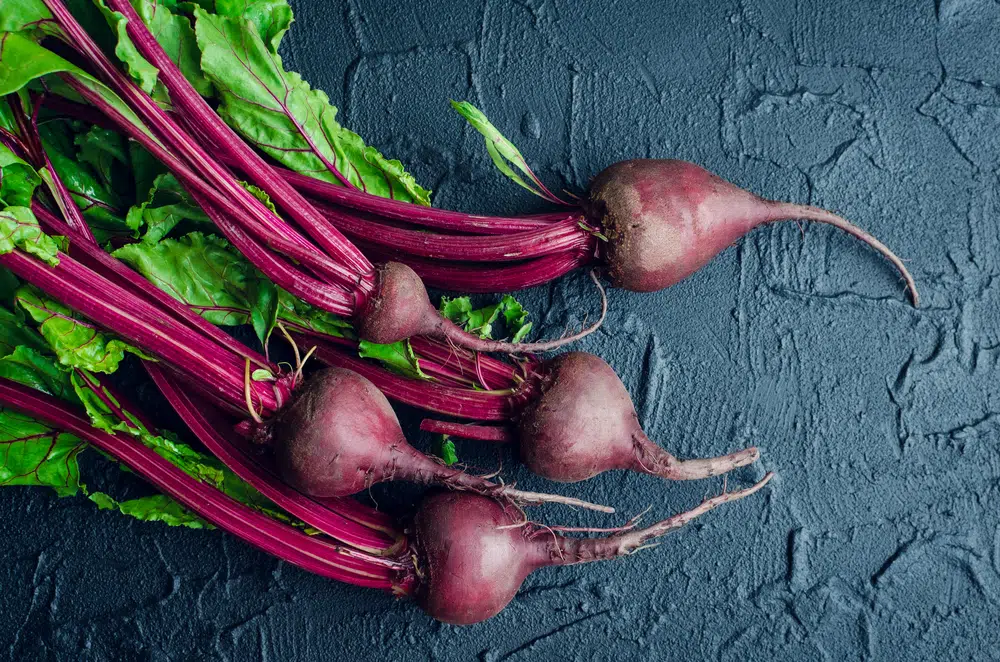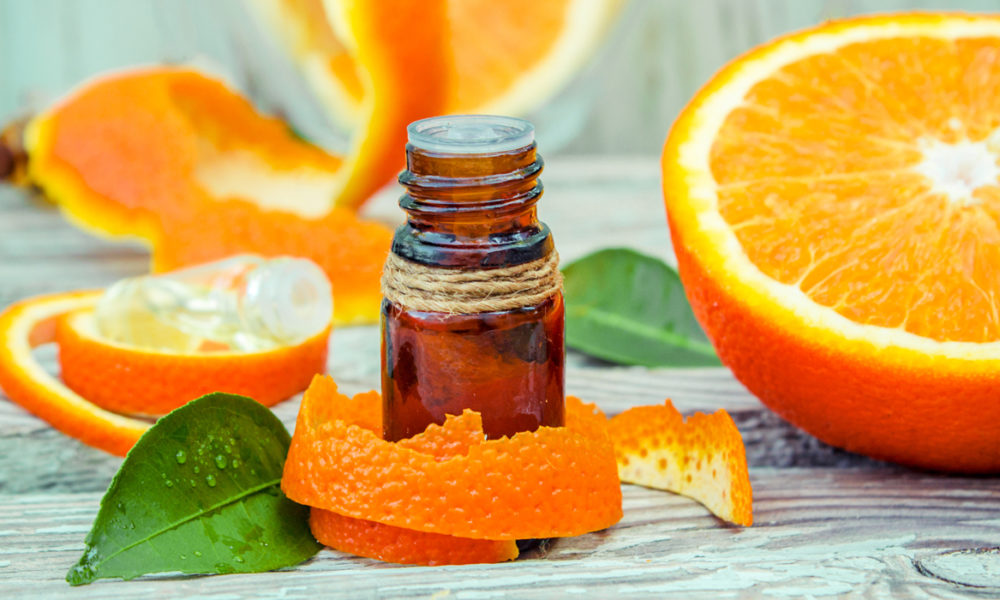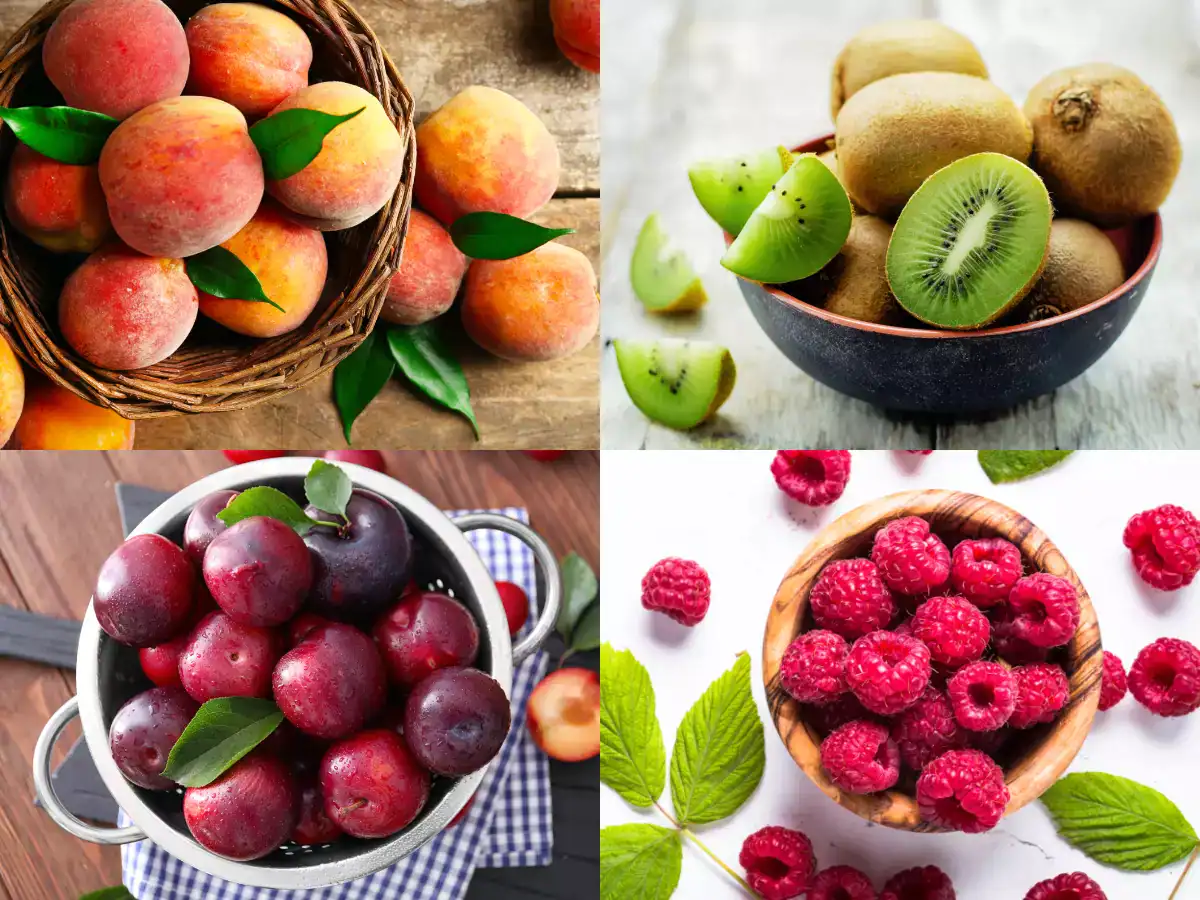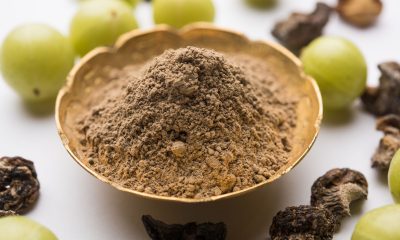Food
Benefits of beetroot leaves

- Health benefits of beetroot leaves
- Beet Leaf Recipes:
- Beets have been cultivated in the Mediterranean region since 2000 BC, cultivation of beets spread to Babylon in the 8th century, and then to China around 850 AD.The beet, along with its green leaves, belongs to the family known as Chenopodioideae.
Within the botanical family, beet leaves are part of the same group that contains plants such as spinach, chard, quinoa, lamb’s quarter “qualities”, and several other wild plants, which means that the leaves Beets can be classified as part of the category of “dark” vegetables.
Because it is a cool-season crop, beets grow quickly and can survive near-freezing temperatures, making it a favourite crop among northern gardeners.
Beets and their green leaves also enjoy a longer than normal cultivation and growth period.
It is best to use beet greens within 2-3 days after refrigeration. Enjoy them on their own as a salad or with other leafy greens, or you can stir-fry them with a little olive oil or balsamic vinegar and salt to create a delicious side dish.
One big tip: If you have too many beet greens, don’t throw them away. Freeze them and use them when making a soup or broth.
Health benefits of beetroot leaves
In addition to providing a large amount of protein, phosphorus, and zinc, beet greens are also a great source of fibre.
Full of antioxidants, they are rich in vitamin B6, magnesium, potassium, copper, manganese, and low in fat and cholesterol.
Based on a 2,000 calorie diet, beet greens contain the following daily values: 220% vitamin A, 60% vitamin C, 16% calcium, and 15% iron.
As if that weren’t enough, studies have also shown that the vitamin K present in beet greens contains blood-clotting properties, helps prevent osteoporosis, works with calcium to increase bone strength, and It could also play a role in the fight against Alzheimer’s disease.
Beet greens also contain a higher iron content compared to spinach, and a higher nutritional value than the beet itself.
The vitamin A content in beet greens helps strengthen the immune system and stimulates the production of antibodies and white blood cells.
The beta-carotene in vitamin A is an antioxidant known to fight the effects of free radicals in the body, as well as cancer and heart disease. Doctors often recommend vitamin A to patients at risk of developing night blindness.
Beet Leaf Recipes:
Use every part of the fresh beet and get two delicious side dishes.
Betabel Leaves Recipes
Ingredients:
A bunch of beets with leaves
-¼ cup olive oil
-2 garlic cloves, minced
-2 tablespoons chopped onion
-1 tablespoon of red wine vinegar
-Sea salt and pepper to taste
Process:
•Preheat the oven to 350 degrees Fahrenheit.
•Wash the beets well, leaving the skin on – “unpeeled”. (It is easier to peel the beets after roasting) Remove the leaves and rinse them, remove any large stems, and separate the leaves.
•Place the beets in a small roasting or roasting pan, toss with 2 tablespoons olive oil, cover, and bake for 45 to 60 minutes or until soft. Serve with red wine vinegar or butter, and salt and pepper.For the leaves: heat the remaining olive oil in a skillet over medium-low heat.
•Add the garlic and onion and cook for a minute.
•Shred beet greens into 2-3 inch chunks and add to skillet, stirring until tender and tender.
•Season with salt and pepper.
(Source: AllRecipes.com )Fun Facts About Beets
Cultivated since prehistoric times, the early Romans only ate the stem of the beet, leaving the root of the beet for medicinal purposes.Summary
Beets and their leaves offer not only two delicious dishes but also two sets of nutritional attributes.The leaves contain vitamins A and K, which offer a host of benefits for the entire body, from the brain to the blood, and even the eyes. In the kitchen, beet greens can be enjoyed sauteed or as a salad.
Another way to get the nutrients from beet greens is through juices.
We hope the article “Health Benefits of beetroot leaves” is of help to you.
Food
6 Benefits of sweet orange essential oil

Table of Contents
Food
25 Benefits of hot shower

- 25 Health Benefits of a Hot Shower
- 1.- It helps you feel better
- 2.- Clean pores and skin
- 3.- Effective for headaches
- 4.- Relax the body
- 5.- Helps blood circulation
- 6.- Relieves flu and cough
- 7.- Protect your body
- 8.- It helps you sleep better
- 9.- Heals sore muscles
- 10.- Helps to lose weight
- 11.- Relieves pain
- 12.- Treatment of high blood pressure
- 13.- Promotes hair health
- 14.- Eliminate stress
- 15.- Keeps the skin hydrated
- 16.- Relieves menstrual pain
- 17.- Treat itchy skin
- 18.- Fight migraine
- 19.- Decongests the nose
- 20.- Become an easy warm-up
- 21.- Promotes the health of the lungs
- 22.- Prevents infections
- 23.- Eliminate toxins
- 24.- Acts against arthritis
- 25.- Helps to heal wounds faster
- Hot shower side effects
Discover the 25 shocking health benefits of a hot shower.
A hot shower could be an amazing treatment to calm your mind. Imagine how nice it is to touch your body with hot water after working so hard during the day.
At least you can ward off tiredness and there are still other health benefits you can get just by taking a hot shower.
25 Health Benefits of a Hot Shower
Here are the health benefits of taking a hot shower, which will change your life.
1.- It helps you feel better
• The first health benefit of a hot shower is to make you feel better.
• Feeling stressed and anxious is common, especially when you have a job that takes up most of your time.
• Taking a hot shower can make you feel better as it calms your nerves, which affects the general state of your body and mind.
• The more stressed you are, the more tired your body will feel.
• So de-stressing can make you feel fresher.
2.- Clean pores and skin
• If you have clean skin, it does not guarantee that you also have clean pores, but if you have clean pores, you have clean and clear skin.
• Exposing your face to air pollution, dirt, and toxins daily causes them to accumulate inside the pores and cause some skin problems like pimples and acne.
• The key to clean skin is having clean pores, so if you want to start it all off, first clean your pores by taking a hot shower.
• Hot water can open pores so that accumulated dirt can be washed away by the shower water.
• After showering, your skin will feel better and cleaner. If you want to clean your pores, it is best to wash your face with cold water afterward so that the pores do not remain open after you shower.
• Sometimes, to keep your skin clean, you don’t need to use expensive skincare products, as the hot shower might help.
3.- Effective for headaches
• Headaches occur when your blood vessels narrow.
• The hot shower can reduce this pressure so that the blood vessels can return to normal.
• In other words, showering with hot water helps you reduce the feeling of headaches, so you may not need aspirin.
• This easy and natural treatment can be safer.
4.- Relax the body
• As mentioned in the first point that the hot shower can make you feel better, one of the reasons is because it is a relaxing activity.
• You can spend a little of your busy time experiencing the feeling of relaxation under the hot shower.
• Warm water is great for comforting your body and reducing all the tension on your muscles after a long and tiring day.
5.- Helps blood circulation
• The healthy heart is greatly influenced by proper blood circulation.
• The hot shower can help improve blood circulation, so you can do some light exercises for your heart with the water pressure to improve it.
6.- Relieves flu and cough
• The hot shower helps dry up mucus when you have the flu.
• Mucus in your throat is the big reason you are experiencing a persistent cough, so drying it out can cure your cough and make you feel better.
• It doesn’t have to be a lengthy treatment, but a simple 5-10 minute shower is great for treating flu symptoms, treating cold sores, and curing coughs.
7.- Protect your body
• The result that your body feels during exercise and the hot shower is the same: it makes it very hot.
• So instead of doing strenuous exercise, just take a hot shower for a while.
• Like exercising, showering in hot water can also cause your body’s cells to release HSPs or heat stress proteins.
• This is one of the reasons that exercise helps build muscle as HSPs do the support.
• This case has even been investigated with mice and the result was surprising.
• Exposing your body to heat can build your muscle by up to 20 percent.
• This research conducted the test for one hour, so it may be the measure of the time required for muscle building.
8.- It helps you sleep better
• If you want a good quality of sleep, taking a hot shower at the end of the day can help you get a good night’s sleep.
• The muscles can be relaxed with hot water so you can refresh your mind as an escape from your busy world.
• Not only the hot shower but also the hot tub work well for a relaxing treatment.
• Just make sure you don’t stay in the tub too long.
9.- Heals sore muscles
• Normally, your muscles will get tense and sore after running or competing for a long time.
• You need to give them a little heat to recover the pain and thus be able to return to normal.
• Warming up your body helps increase the rate of the metabolic reaction so that your muscles can recover after pain.
• When the rate of the metabolic reaction is reasonable, the chemical processes in your body can function properly and one of the results is that your muscles heal better.
10.- Helps to lose weight
• The hot shower can be a good trick to lose some weight, and it has been shown in a study that people with diabetes can feel the benefit of lowering their glucose and sugar levels.
• However, the study investigated with a hot tub, not a hot shower, so the result could be different with the shower and another study should also be conducted.
11.- Relieves pain
• Muscle-related aches and pains tend to occur after injuries or sports, so treating your muscles with a good hot shower can help.
• Finish your exercise with a hot shower is an amazing idea to keep your muscles healthy.
• Also, joint and muscle pain in arthritis can also be treated with hot water.
• It may not be a total cure in the end, but relaxing your muscles, reducing inflammation, and relieving pain is what you can do.
• Hot water is good for improving blood circulation and results in loose muscles as well.
• In the case of sore muscles, the Jacuzzi is more useful than the hot shower.
12.- Treatment of high blood pressure
• High blood pressure is closely related to heart disease and must be treated appropriately to prevent the deadly disease from growing.
• The effectiveness of hot water in reducing high blood pressure was shown in a study that conducted hot bath research.
• However, even if this natural treatment seems easy and simple, it should be done only when your doctor has said yes for allowing you to do this.
• Hot water can affect your heartbeat, so making a consultation first is very important.
• Remember that it is a hot bath that is said to be helpful, according to a study, not a hot shower.
13.- Promotes hair health
• Not only your skin but also your hair can reap the benefits of hot water.
• While your skin may become clean and fresh after a hot shower, your hair may be healthier as the water is rejuvenating.
14.- Eliminate stress
• The relationship between HSPs or heat stress proteins and hot water has been mentioned, and now there is something more good about this.
• Those proteins are used to protect your body from stress.
• By maintaining their production, your body can resist stress because they work to protect your body and if they are successful in that work, the next time they feel stress, they will work even better since they have learned how to do it from the beginning.
• Previous experiences. For this reason, it is necessary to maintain your production and hot water is one of the simple ways to do it.
• It can be as simple as taking a hot shower every day and keeping the amount of HSP in your body.
15.- Keeps the skin hydrated
• The good effect of hot water on the skin is more than just cleaning the pores, but it is also helpful in moisturizing the skin for longer.
• You can avoid dry and chapped skin by taking a proper hot shower.
16.- Relieves menstrual pain
• Period cramps are annoying and frustrating.
• Instead of taking medication to deal with this, it is better to take a hot shower and the cramps can be treated well.
• It is easy, simple, and cheap.
17.- Treat itchy skin
• When your skin itches, try to drink some hot water when you shower and it will help to soothe your skin.
• Even when there is a rash on the skin, hot water can be used to remove it.
• You can feel your skin better after taking a hot shower.
18.- Fight migraine
• Since hot water can help improve blood flow, taking a hot shower is one of the simplest ways to combat migraines.
• With better blood flow, migraines can be eliminated so you can feel more energetic without the migraines stopping you from doing your activities.
19.- Decongests the nose
• A stuffy nose is annoying.
• You are very distracting from sleep, so you have to spend the whole night just to find the right way to breathe properly.
• If it ever happens to you, don’t stress, just wake up and take a hot shower.
• With the hot water’s ability to dry up the mucus in your nose, you can finally breathe properly and sleep well.
20.- Become an easy warm-up
• The health benefits of a hot shower could make you overheat.
• Instead of spending a few minutes stretching to warm up your body before exercises, consider simply taking a hot shower and the result could be the same.
21.- Promotes the health of the lungs
• If you experience shortness of breath like asthma, just use hot water and it can open your lungs so you can breathe easier.
22.- Prevents infections
• The reason why hot water can prevent infection is that it can kill bacteria, which is primarily the cause of the infection.
• Taking a hot shower every day can keep you healthy due to infection with the germs on your skin being cleaned.
23.- Eliminate toxins
• It acts as a detox by removing toxins from your body through sweat.
• With its hot temperature it can increase the heat of your body, making you sweat and healthy.
24.- Acts against arthritis
• It has been mentioned above that hot water is good for relieving muscle pain, including arthritis.
• You only need to dedicate 20 minutes of your time every day to take a hot shower so that your arthritis-related pain can be relieved due to improved blood circulation.
25.- Helps to heal wounds faster
• Don’t worry about taking a hot shower when you have open wounds on your skin as it will stimulate your healing processes.
• Still on the ability of the hot shower to improve blood circulation, plays an important role in helping the healing process improve, thus acting as an antibiotic for the skin.
• Note that you should not attempt this for large and bad wounds as it might be appropriate only for smaller ones.
Hot shower side effects
Just because the hot shower is packed with many benefits does not mean that it is completely and completely healthy. There are still other side effects to watch out for, so you won’t be taking the shower too long and too long.
1.- It affects blood pressure
• Although hot water can be good for blood flow, it can be bad for blood pressure.
• Hypotension can occur when blood vessels dilate due to the heat of the water.
• Even when you are healthy without cardiovascular disease, such a condition can make your heart work harder and faster, resulting in a difficult situation.
• The worst effect of this strained heart is fainting that begins with lightheadedness.
• You can imagine how dangerous it is to collapse in a bathroom where the floor is so wet and slippery.
2.- It causes nausea
• Your blood flow can change during a hot shower as the temperature of the water influences it.
• Such a change in some people can cause nausea and even vomiting, especially when they take a shower after finishing eating something that could trigger it.
• However, this type of nausea can easily go away once you get out of the shower.
• So if you experience such a condition, just stop the hot shower and get out of your bathroom.
3.- Stun
• The aforementioned change in blood flow also influences the brain and leads to dizziness.
• In this case, you may feel dizzy and unbalanced.
• This imbalance is very dangerous because it can prevent you from getting out of the shower easily, especially on wet floors.
4.- Exposure to chlorine
• This can be dangerous to your health as warm water is the potential to expose your skin to chlorine due to its ability to open pores.
• Once your pores open when you take a hot shower, the chlorine from the shower stream can easily enter your body through the pores.
• Imagine the amount of chlorine your pores will inhale since the skin is the largest part of the body.
• Chlorine, compared to tap water, is much more dangerous.
• If you drink water that contains chlorine, there are still liver and kidneys inside your body that can filter it, but when it enters your pores, and then there is nothing to filter as it will move directly into the bloodstream.
• One study showed that chlorine can cause bladder cancer, but the number increases when chlorine is inhaled, such as people who swim in chlorinated water or take a hot shower, which means that inhalation increases the risk of bladder cancer.
• Therefore, the longer you are in a hot shower, the more you will get chlorine and other chemicals in your body.
5.- Dry the skin
• Although hot water can adequately cleanse and hydrate the skin, exposing the skin to hot water for too long can lead to dryness.
• This is because the temperature of the water causes the skin’s oil barrier to be removed.
• It is best that once the hot shower is over, your skin is applied with moisturizer to retain its moisture.
• Dry skin is not comfortable as it sometimes itches and scratches and scratches you.
• So don’t forget to use the moisturizer afterward and stick with a shower gel that contains moisturizer to prevent dryness.
The key to getting the benefits of your hot shower is not taking too long.
Chemicals can be the most dangerous thing that could harm your body, so you should not put your health at risk.
It is very nice to take a hot shower during the cold months, but you must remember that your body cannot resist it.
Take it properly, feel the heat, and as the benefits roll in, stop and go.
You can do this every day as long as it’s only for a few minutes.
To reduce the number of chemicals inhaled during shower time, turn on the bathroom fan so that air circulation can occur.
Food
8 low sugar fruits in your diet

Table of Contents
- Avocado
- Lemons
- Guavas
- raspberries
- Watermelon
- Papaya
- Strawberry
- blueberries
- Discover the 8 low sugar fruits in your diet.
You are on a diet? Whether you’re on a diet or not, these fruits help you maintain a healthy, guilt-free intake.
Avocado, lemon, and papaya are some fruits that contain less sugar.
Fructose, the sugar present in fruit, is healthy as part of a balanced diet.
Fruit is a food that should play a leading role in your diet, better in whole pieces than in juices or smoothies; if possible, seasonal and local to leave a smaller environmental footprint.
If you are looking for fruit options that do not have too much sugar, these are the main candidates to be included in your diet. With them, you help regulate your weight and obtain fiber, vitamins, and minerals, as well as good hydration.
Among the fruits with less sugar, options such as avocado, citrus fruits such as lemon, or forest fruits such as raspberries or blueberries stand out.
Avocado
Avocado is a fruit with a low amount of sugar.
Avocado is the fruit with the least amount of sugar since it only contains 0.7 grams per 100 of food. In this way, a whole piece has only 1.33 grams of sugar.
In addition, avocados are rich in potassium, fiber, healthy fats, iron, and vitamins such as E and C.
Lemons
In lemons we find 2.5 grams of sugar for every 100 grams of lemon; this makes them the second fruit with the lowest proportion of this nutrient.
Since they are rarely eaten whole due to their acidic character, a squeeze of lemon is the ideal accompaniment to salads and sauces. It helps prevent fluid retention and stands out for its purifying functions. It is rich in calcium, sodium, magnesium, iron, and vitamin C.
Guavas
Guavas are a delicious, low-sugar fruit.
According to data from WebMD, guava provides 5 grams of sugar and approximately 3 grams of fiber.
It also stands out for its high amount of vitamin C, which ranges between 486 mg and 871 mg per 100 grams, four times more than orange. Other nutrients whose presence shines in guava are vitamin A, iron, calcium, and phosphorus.
raspberries
Raspberries are a delicious, low-sugar option.
A cup of raspberries will provide you with 8 grams of fiber and only 5 grams of sugar. It is a light, hypocaloric fruit that helps you feel full and hydrated.
They are also rich in calcium, potassium, vitamin B9 (folic acid), and vitamin C; they improve skin and eye health, control diabetes, and prevent diseases and cell damage thanks to the presence of phytonutrients.
Watermelon
Watermelon is one of the fruits that contain less sugar.
There are approximately 6 grams of sugars per 100 grams of sadía, the queen fruit of summer; It is rich in water and in which the important beta-carotene abounds.
Eating a piece of watermelon a day will benefit your immune system, your digestion, and your good eyesight.
Papaya
Papaya is high in fiber and contains flavonoids.
According to Medical News Today, medium papaya has 120 calories, 30 grams of carbohydrates—including 5 grams of fiber—and 18 grams of sugar; or what is the same, 6 grams of sugar for every 100 of the fruit.
Among its many advantages, papaya is a diuretic, antioxidant food that takes care of the heart thanks to its high content of flavonoids.
Strawberry
Strawberries are delicious and rich in vitamin C.
A cup of whole strawberries has only 7 grams of sugar. On the other hand, they are a great source of vitamin C, anti-inflammatory, good for bones and transit, and ideal for losing weight and improving defenses.
blueberries
Blueberries help prevent urinary tract infections.
100 grams of blueberries contain 4 grams of sugar. This fruit of the forest prevents urinary tract infections and takes care of the heart, memory, and eyesight. In addition, they concentrate a high nutritional power on a few calories.
Depending on the type of blueberry, some nutrients or others stand out. Blueberries are rich in fiber, vitamin C, vitamin K, and manganese; while lingonberries also abound in vitamin C and antioxidant polyphenols.
Related Searches….
Low-sugar fruits list
low-sugar fruits for weight loss
low-sugar fruits and vegetables
High fiber low-sugar fruits and vegetablesLow sugar fruits for diabetics
High sugar fruits to avoid
Sugar in fruit chart
Fruits low in sugar and carbs
Are blueberries low in sugar
How much sugar in strawberries
Raspberry sugar content
How much sugar in blueberries
Sugar content in fruit and vegetables chart
-

 Food1 year ago
Food1 year ago10 + Benefits of carrot juice and side effects
-

 Benefits4 months ago
Benefits4 months agoThe Benefits of Joining Gym Lumolog – Improve Your Fitness & Health
-

 Health1 year ago
Health1 year ago50 Super Healthy (And Very Often Cheap) Foods
-

 Health1 year ago
Health1 year ago5 Shocking health benefits of kinkeliba and side effects
-

 Food1 year ago
Food1 year ago8 shocking benefits of leek juice and side effects
-

 Health1 year ago
Health1 year agoBenefits of guava leaves Sensually
-

 Weight Loss1 year ago
Weight Loss1 year agoChaz Bono weight loss secret
-

 Health1 year ago
Health1 year ago13 shocking health benefits of Thai eggplant












